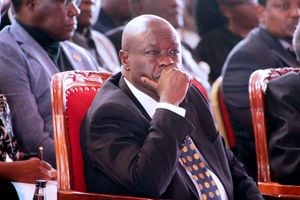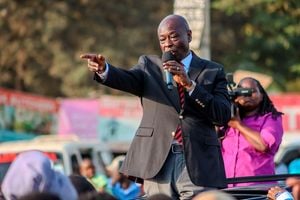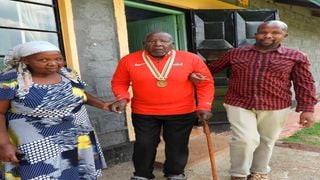
Legendary Kenyan athlete Wilson Kiprugut Chumo (centre) poses for a photo on July 22, 2021 with his children Sarah Langat (left) and Gideon Kipngeno at his home in Kipchebor village in Kericho County.
| Vitalis Kimutai | Nation Media GroupSports
Premium
Legendary Chumo tips Kenyan athletes to shine in Tokyo
What you need to know:
- Retired runner urges youngsters to compete clean and fair in Olympics
- Runner who won first Olympics medal for Kenya in 1964 says teamwork will propel squad to glory
- Wilson Kiprugut Chumo, Olympic Games,1964 Olympic Games,2020 Tokyo Olympics
A rusty iron gate opens inwards ushering one into a lush green compound where three houses, a granary and a shed stand in a curved formation.
A tall, strongly built old man sits on a chair holding a walking stick on his left hand, a white striped handkerchief on the right hand as he shields himself from the late afternoon sun in a shed under a huge indigenous tree near the entrance.
He looks pretty much like any avuncular grandfather eagerly waiting for his grand and great grandchildren to arrive from school at Kipchebor village in Ainamoi constituency, Kericho county.
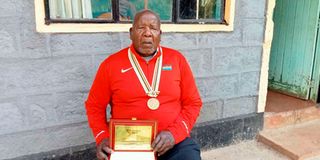
Mzee Wilson Kiprugut Chumo displays a recognition award from the National Olympic Committee of Kenya (NOC-K) during an interview at his home in Kipchebor village, Kericho County on July 22, 2021.
His name is Wilson Kiprugut Chumo – the first Kenyan who win a medal at the Olympic Games. Kiprugut achieved the feat at the 1964 Olympic Games, in Tokyo, setting the stage for the current crop of athletes.
His face brightens with joy as he extends his hands for a firm handshake upon learning that the people before him – majority of whom are the age of his grandchildren – are journalists out to interview him a few hours before the opening ceremony of the 2020 Tokyo Olympics.
To Mzee Chumo, the 2020 Tokyo Olympics is a personal and emotional affair. It is in Tokyo in 1964 that he flew the Kenyan flag high, winning the country her first medal at the Olympics, a bronze in 800 metres.
“National Olympics Committee of Kenya (NOC-K) members made me to understand that the Japanese government was keen on having me travel to Tokyo for the Olympics but it was not possible,” he says.
It would have been a great memorable trip to the venue where he put his name among the list of the world’s top athletes.
"I did not give it much thought when I won gold at the 1964 Olympics. It dawned on me far much later that it was a major win," Chumo said.

Some of the medals that Wilson Kiprugut Chumo during his heydays.
Chumo, who started his athletics career at Kaptebeswet Primary School and Sitotwet Intermediate School in Kericho County, is disappointed by use of performance-enhancing drugs among athletes.
“I wish to advise Kenyan athletes to run clean, avoid drugs by all means and win fair and square. It is possible. We did it in our time, it has been done by great athletes and it is still doable,” said Mzee Chumo.
“I am wishing Team Kenya well. They should embrace team work and discipline."
Chumo, 83, is grappling with health complications, including a failing eyesight and has to be aided to walk. He relieved the history-making moments in Tokyo 57 years ago as if it happened days ago.
“I was determined to beat athletes from Europe and Asia in the competition and I had prepared well for the event, having been beaten earlier in Australia by some of them,” Mzee Chumo says, scratching his head and looking into the blue sky above as if search for answers.
He went on to win many medals in his career before retiring and retreating to his village in Kericho County to bring up a family.
“When we competed against athletes from other countries, we were very patriotic and made sure that we carried the Kenyan flag high. We set the pace for others who took after us,” he said.
It does not bother him much that he has not been recognised by the government for his contribution to sports in the country even as some of his peers bask in the limelight.
“The fact that some of us were not recognised for our contribution to sports development in the country is not because the people in charge do not appreciate what we did. They do not understand it all,” he said.
Kericho County government has however been toying with the idea of renaming the Kericho Green Stadium after him, but that has not been followed by any concrete action.
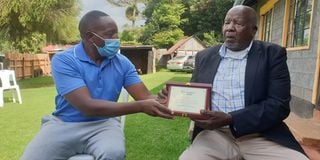
National Olympic Committee of Kenya (NOC-K) secretary-general Francis Mutuku (left) presents a recognition plaque to legendary athlete Wilson Kiprugut at his home in Kipchebor, Kericho County on June 5, 2021.
Some have suggested that a road be named after the legendary athlete who has been a role model for many youth in South Rift region.
A picture of him being lifted shoulder-high on October, 29, 1969 at the Jomo Kenyatta International Airport when he had returned from competing abroad takes pride of place in his sitting room.
He has several medals to his name which he has kept in a box at his home for future generation.
At the peak of his career, Mzee Chumo won a bronze medal in the 800 metres (then 880 yards) competition. Athletes from Kenya have gone on to dominate the race.
Chumo again put Kenya in the world map when he won a gold medal in the 400 metres (then 440 yards) and 800 metres (880 yards) in the inaugural All African Games held in Brazzaville, Congo in 1965.
In 1968, Chumo won a silver medal in the Summer Olympics Games held in Mexico in what marked the tail end of his career in athletics.
SIx years earlier (1962), he had competed in the 4x400 relays, but his team finished fifth in the competition, but went on to secure a bronze medal in 800 metres (880yards).
He also won bronze at the 1966 Commonwealth Games held in Kingston, Jamaica.
“At the time, we undertook sports as a hobby. It had not been commercialised as is happening now the world over,” said Mzee Chumo, who was crowned Kenya Sports Personality of the Year in 2010.
“I remember I was paid 20 dollars (which was the equivalent to Sh140 at the time) and it was so much money at the time,” said Mzee Chumo who was born in 1938 at Kinamget village in Kericho.
The highest amount of money he remembers being paid was 300 dollars (Sh 2,100 as per the exchange rate at the time). He said that he used his earnings to buy land, building a house and used the rest for his family’s upkeep.
“I built my family home with savings from my days in the army (Kenya African Rifles), from where I retired in 1974 with the rank of a sergeant, and the pocket money we got for participating in sports outside the country,” said Mzee Chumo.
His first born child, Sarah Langat and his last born son Gideon Kipngeno Rugut, take care of him at home. He lost his wife Ruth on July 20 last year.
As the Olympics kicks off, it is hoped that Mzee Chumo’s exploits will spur Team Kenya to greater heights.



